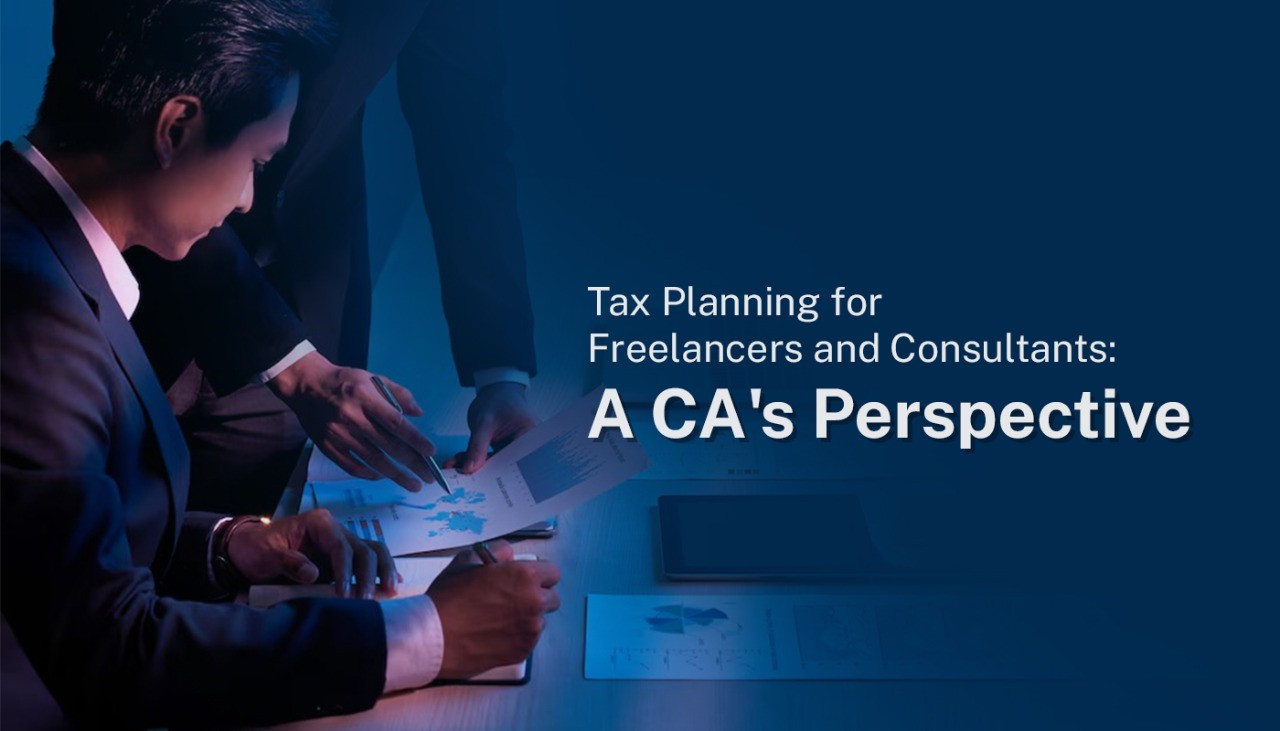


Being a freelancer or self-employed individual in India comes with responsibility for your tax planning. Understanding the tax laws and implementing strategies can significantly reduce your tax burden and boost your revenue.
This blog will walk you through essential tax planning techniques tailored to India's freelancers and self-employed professionals.
Key Steps to Minimise Your Tax Liability and Ensure Compliance
Understand Your Tax Obligations
The first step in effective tax preparation is to understand your tax obligations. If your annual income exceeds the basic exemption level, you need to file an income tax return (ITR) every year. Your business income, which is your net profit after deducting all permissible expenses, is subject to taxes.
Freelancers generally fall under the "self-employed" category and typically file their ITR under Section 44ADA (presumptive taxation scheme) or Section 44AA (for businesses with turnover above the specified limit).
Maintain Proper Records
Accurate recordkeeping is crucial for precise tax preparation. You should carefully track all your business-related expenses, including receipts and invoices. This practice allows you to claim deductions and reduce your tax liability. It's highly recommended to maintain separate bank accounts for your personal and business needs to avoid complications during tax season. Keep detailed records of all invoices raised, payments received, and payments made. Ensure all income and expense transactions are meticulously recorded in your bank statements.
Take Advantage of Deductions
Leveraging deductions is one of the most effective tax planning strategies for small-business owners and self-employed individuals. You can deduct a wide range of business expenses, including:
● Rent (for office or home office)
● Travel costs
● Office costs and supplies
● Professional fees (e.g., consultants, contractors)
● Insurance premiums
● Depreciation on assets (e.g., gadgets & equipment)
● Marketing expenses
Additionally, Sections 80C and 80D of the Income Tax Act allow deductions for payments to pension funds and health insurance premiums, respectively. Remember to keep thorough records of all deductible expenses.
Choose the Right Business Structure
The choice of business structure significantly impacts your tax planning. As a freelancer, you can operate as a sole proprietorship, a partnership, or even register your company as a private limited company or a limited liability partnership (LLP). Each structure has different tax implications. For example, a sole proprietorship is simple and economical to set up, but lacks limited liability protection.
A private limited company offers limited liability protection but is more complex and expensive to establish and run. It's crucial to select the structure that aligns best with your needs and objectives. Incorporating your business can potentially lead to lower corporate tax rates and increased access to deductions and credits.
Invest in Tax-Saving Instruments
Investing in tax-saving instruments is another effective strategy to reduce your tax burden. Several options are available that qualify for tax incentives under Section 80C of the Income Tax Act:
● Public Provident Fund (PPF): A long-term, government-backed investment offering tax-free returns and deductions under Section 80C.
● National Savings Certificate (NSC): Another tax-saving investment option.
● Tax-saving Fixed Deposits: These deposits also offer tax benefits.
● Equity-Linked Savings Scheme (ELSS): These funds offer potential for high returns and tax deductions under Section 80C, though they have a 3-year lock-in period.
● National Pension Scheme (NPS): Contributions to NPS qualify for an additional deduction of up to ₹50,000 under Section 80CCD(1B), over and above the Section 80C limit.
Take Advantage of Presumptive Taxation Schemes
India's tax laws offer simplified taxation schemes that can be highly beneficial for freelancers and self-employed professionals:
● Section 44ADA: This section provides a presumptive taxation mechanism for independent contractors and professionals with gross receipts up to INR 50 lakh. Under this scheme, you can declare your income at a fixed rate of 50% of your gross receipts without maintaining extensive records. This simplifies the tax filing process and can save you time and money.
● Section 44AD: This section applies to freelancers and self-employed individuals engaged in certain specified professions or businesses. If your total turnover or gross receipts are up to INR 2 crore in a financial year (for businesses other than plying, hiring, or leasing goods carriages), you can opt for this scheme.
Under Section 44AD, you are required to declare your income at a predetermined rate of 8% of the gross receipts or turnover. For example, if your gross receipts are INR 50 lakh, your taxable income would be assumed to be INR 4 lakh (8% of INR 50 lakh). Opting for this scheme means you are not required to keep thorough books of accounts or have them audited, though you will still need to keep basic documents like invoices, receipts, and vouchers.
Consider GST Registration
If your annual turnover exceeds ₹20 lakh (or ₹10 lakh for special category states), GST registration is mandatory. While it adds some compliance burden, it allows you to claim GST credit on purchases, reducing your overall business costs. GST registration can be beneficial for freelancers in sectors like consulting or design, as you can reclaim GST paid on business expenses.
File Your Returns on Time
Filing your Income Tax Return (ITR) is mandatory for freelancers, even if you have no tax dues. Timely filing ensures you avoid penalties and maintain a clean record with the Income Tax Department. Even if your income is below the taxable limit, filing a return may be necessary to avail a tax refund or carry forward losses from previous years.
Stay Updated on Tax Laws and Regulations
Tax laws are dynamic, and staying informed about changes is crucial for effective tax planning. Regularly follow relevant tax publications, attend workshops, and consult with a tax professional to be aware of new deductions, credits, or compliance requirements.
Conclusion
You can ensure your financial well-being by understanding the requirements, maintaining meticulous records, claiming eligible deductions, wisely investing, and staying abreast of tax laws. If you're ever in doubt, always consult with a professional Chartered Accountant for expert guidance.